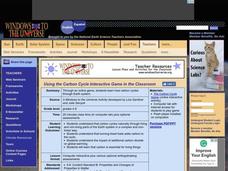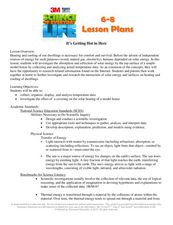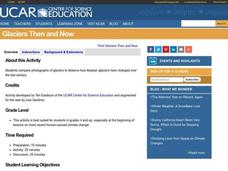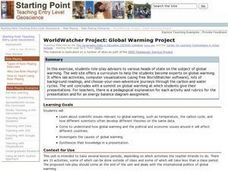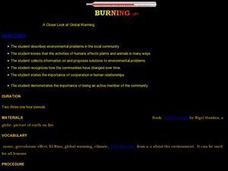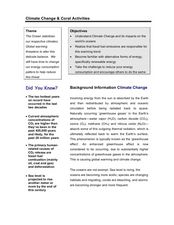US Environmental Protection Agency
Sea Level: On the Rise
With the global temperature on the rise, the effects of climate change are starting to be seen. However, many people have a difficult time conceptualizing the long-term effects, such as sea levels rising. Given an easy and effective...
US Environmental Protection Agency
Carbon Through the Seasons
Meteorologists view an animated video by the Environmental Protection Agency to learn how the carbon cycle works, and then move into groups to analyze and graph actual data of the atmospheric carbon dioxide concentration from Hawaii's...
Curated OER
Using the Carbon Cycle Interactive Game in the Classroom
An online reading and interactive game bring the path of a carbon molecule to life for your earth science explorers! As an assessment, learners can map out or write about their experience in the carbon cycle. Thoroughly written...
Curated OER
It's Getting Hot in Here
Discover the environmental and economic impact of global warming. After reading an article, emerging environmentalists identify how different countries are responding to the Kyoto Protocol. They research emission laws and write a news...
Space Awareness
Water is a Heat Sink
One of the key objectives of Europe's Copernicus Earth program is to monitor the temperatures of the oceans and seas on Earth. Young scholars learn the effects of different heat capacities through two experiments. These experiments...
Space Awareness
Oceans on the Rise
Temperature rises and land disappears! Through a lab exploration, learners understand the effect of temperature increase on water similar to the effect of global warming on our oceans. As they heat the water in a flask, they measure the...
Space Awareness
The Big Meltdown
Explore the world (our world) of melting ice caps. Why are these caps melting? What is the effect of melting ice caps? Dive into the ever-present issue of global warming with a resource that has learners looking at data and participating...
Curated OER
Unit 2: Global to Local: Understanding My Place in the Hydrosphere
What does the ground around your home have to do with water pollution? Young ecologists learn about their local watershed and create their own cause-and-effect models of the hydrosphere.
Center Science Education
Glaciers: Then and Now
Cooperative groups compare pairs of photos of Alaskan glaciers. They match a historical photo to the recent photo of the same glacier. The class discusses what conditions are necessary for glaciers to retreat. This abbreviated activity...
Space Awareness
Oceans as a Heat Reservoir
Oceans absorb half of the carbon dioxide and 80 percent of the greenhouse gases released into the atmosphere. Scholars learn how and why the oceans store heat more effectively than land and how they help mitigate global warming. Pupils...
Purdue University
Global Design for the Seasons
People don't all get the same amount of sun at the same time of the year. Collaborative groups explore how the motion of Earth contributes to the idea in an inquiry-based STEM lesson. Learners first investigate how the rotation of Earth...
Curated OER
The Fact of Global Warming
Students investigate the harmful impact of global warming by reading news articles. In this environmental care lesson, students analyze an article about the Kyoto Protocol and its goal of saving our environment. Students investigate...
Curated OER
Global Warming and Hurricanes: Is an Increase in the Number of Stronger Hurricanes an Indicator of Global Warming
Ninth graders investigate whether stronger hurricanes are signs of global warming. In this environmental science lesson, 9th graders research both sides of the issue about global warming. They debate for or against this issue in class.
Curated OER
WorldWatcher Project: Global Warming Project
Learners conduct lab activities, computer visualizations, and other various forms of research in preparation for a role-play activity in which they assume the identities of advisors to various heads of state on the subject of global...
Curated OER
Global Meltdown
In this environmental science lesson, students study data and animation on global temperature increase to complete 8 short answer questions that follow.
Curated OER
Burning Up! A Look at Global Warming
Students investigate global warming. In this global warming instructional activity, students watch movies about global warming, discuss problems in their local community and see how communities have changed over time. Students realize...
Curated OER
Does Global Warming Increase the Intensity of Atmospheric Natural Disasters?
Students study global warming by communicating the problem, process and solutions. In this global lesson students use graphs, research and write a critical stance on natural disasters.
Curated OER
Illuminating Climate Change: Connecting Lighting and Global Warming
Students analyze energy usage and connect energy usage to fossil fuel consumption. In this global warming and pollution lesson, students what fuels are used to generate electricity and how much CO2 each fuel produces, then graph the...
Curated OER
Climate Change & Coral Activities
Students study how the ocean stabilizes our planet's climates and how global warming is becoming a threat to this fine balance. In this climate change lesson, students identify that fossil fuel emissions are responsible for global...
Baylor College
Finding the Carbon in Sugar
In session one, demonstrate for your class how a flame eventually goes out when enclosed in a jar in order to teach that oxygen is required for combustion. In session two, class members then burn sugar in a spoon to observe how it...
Baylor College
Rainbow in the Room
Uncover the science behind the beautiful phenomena of rainbows with a simple demonstration. Shine light through different-sized containers of water as young scientists learn that rainbows occur when visible light is split up into its...
Baylor College
Fossil Fuels and the Carbon Cycle
Humans are quickly depleting Earth's fossil fuels and locating them is becoming increasingly difficult! Layered muffins are used for models as young geologists take core samples in order to determine the presence of oil. Consider first...
Baylor College
Measuring and Protecting Skin
Several subjects are addressed within the context of a science lesson about the sun's ultraviolet rays. Elementary earth scientists consider protection of the skin with sunscreens (health), estimating and measuring surface area or an...
Baylor College
Fuel for Living Things
During a three-part lesson plan, learners make a cabbage juice pH indicator and use it to analyze the waste products of yeast after feeding them with sugar. The intent is to demonstrate how living organisms produce carbon dioxide, which...




